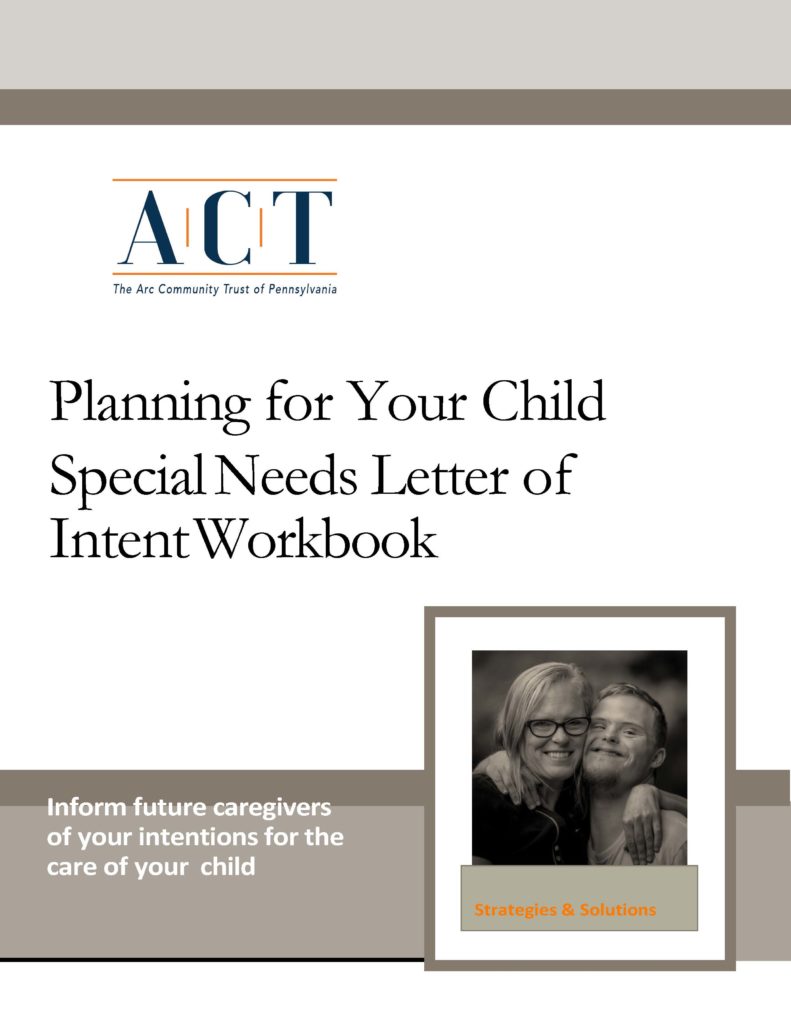When should you start planning?
We all have things we are going to get done tomorrow, next week or in the near future. As a parent or guardian, a document (Planning Workbook/LOI) that serves as a guide to individuals that may care for your child in the future simply can’t wait! Completing a Planning workbook/LOI can be overwhelming but it doesn’t have to be. Simply take it step by step and sooner then you know you will be well on your way!
The Planning Workbook also known as a letter of intent (LOI), while not a legal document, is key to your special needs planning. There’s a tremendous amount of information about a child that only parents really know and understand, and the LOI is intended to share as much of that detail as possible. It’s a blueprint for guardians, trustees and service providers, summarizing information regarding family history, your child’s needs, habits and preferences, and your hopes for the future. It’s meant to ease the disruption that will inevitably occur when you are no longer primary caregiver.
At ACT we have provided a PDF fill-able Planning Workbook. This free document will enable you to add information, edit that data over time and keep it current. There are other electronic platforms you can consider, but they tend to charge an annual fee. Regardless of what platform you use the key is get started. So what are you going to collect in this document?
- Overview –A summary of the child’s life to date and your aspirations for the future
- Family history– Information and “favorite memories” relating to parents, grandparents, siblings and friends, as well as the child
- Medical care– Detailed description of disabilities, with medical history, medications and current healthcare providers
- Benefits– List of programs such as Medicaid and Supplemental Security Income (SSI), in which the child is enrolled, agency contacts, case numbers, documentation requirements
- Daily routines – Include activities he loves or hates, and chores he typically performs
- Diet – Likes and dislikes, allergies, interactions with medication
- Behavior management –Programs in place, level of success, unsuccessful past efforts
- Residential – Current living arrangements and changes which may be necessary in your absence
- Education– Programs to date and preferences for the future
- Social life – Activities he enjoys, including vacations
- Career– Types of work he enjoys/might enjoy and supports required
- Religion-Role this plays in child’s life
- End-of-life–List preferences and arrangements that have been made.
When you complete the workbook, it’s best to review/edit its content annually and tell future caregivers how to locate it.
It’s also a good idea to create a two-page, bulleted version for quick reference, with details such as key phone numbers, “meltdown techniques,” and buzzwords or colors that can trigger a negative reaction.
No matter what format, platform or style you choose, it will ease your mind knowing that there is a clear map and guide for the care and engagement of your loved one if something happened to you.
Day-to-Day with ACT
Our day-to-day special needs trust services include, but are not limited to:
Get Connected Today!
If you have questions, need guidance or would like to speak to an ACT staff member about a specific issue, please send us an email through our contact form. ACT also is able to provide organizations and groups speakers on a variety of Trust and Trust related topics. Simply contact us and we are happy to make the appropriate arrangements. We look forward to hearing from you!